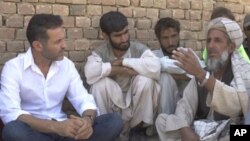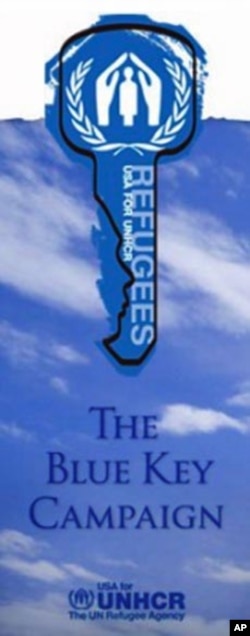Fewer than half of Americans know what a refugee is and 38 percent have contributed to help them, according to the findings of a recent survey. An initiative called The Blue Key Campaign is designed to open Americans’ eyes to the growing global refugee crisis.
Leaving home, never knowing when - or if - you’ll be able to return, then living for months or years in a refugee camp, is a common experience for many around the world.
“Forty-three million people around the world are either refugees or displaced,” says Khaled Hosseini, the Afghan-American author of the bestselling books "The Kite Runner" and "A Thousand Splendid Suns."
Hosseini was 11 years old when the Soviets invaded Afghanistan. His family fled to France and was later granted political asylum in the United States.
“I have always felt a kinship with the plight of people who lost their homeland, who have been uprooted, keeping in mind that I myself was extremely lucky the way it turned out,” Hosseini says. “I’d never compare myself to the millions of Afghan refugees who lived in Pakistan or Iran in refugee camps.”
Hosseini had a chance to see the life of a refugee for himself in 2007, when he returned to Afghanistan as an ambassador for the UNHCR, the UN High Commissioner for Refugees.
“Many of the people I met had lived in Pakistan or Iran for 10, 20 years, entire families whose children had been born abroad,” he says. “I found out that life for many folks is really an uphill struggle for the basic necessities of life, among them, shelter. I met entire communities of people who were living out in makeshift shelters, in tents, sometimes underground, where people had spent two or three winters in a row, huddled in holes they had dug underground.”
Moved by his visit, Hosseini became an active advocate for refugees. He founded the Khaled Hosseini Foundation to provide humanitarian assistance to Afghan refugee families, including health care and economic and educational opportunities.
Last month, he also became a spokesperson for The Blue Key Campaign, a United Nations initiative to draw Americans’ attention and support to the plight of the world’s refugees.
“It’s a very simple web site," he says. "You can purchase a blue key for $5. What we’re also hoping to achieve through the campaign is that people will share the knowledge that they gain, will share their key with their friends, their families, their classrooms, their congregation, their communities and they will become spokespersons for these millions of uprooted people who, very frequently, have no face, and have no voice and nobody to speak up for them.”
Right now, Hosseini's attention is also focused on the situation in Libya.
“For instance you know since February this year, nearly 3 quarter of a million of Libyans have become refugees and displaced because of the war in Libya,” he says. “Although the news media is very good at covering the latest battles in Misrata or Benghazi, unfortunately we’re not quite as good in covering the plight of the people who are affected by this war. What happened to the people? How their life is affected? What challenges do they face? These are the things that the Blue Key Campaign is meant to highlight.”
The Blue Key campaign is run by USA for UNHCR, a nonprofit which supports the UN refugee agency.
“This is part of a larger campaign we have in the United States,” says Marc Breslaw, executive director of USA for UNHCR. “We are part of a global effort to bring larger and larger private sector contributions into the UNHCR organization, so it is able to do more of what it does and to do it better than it does.”
Breslaw is pleased with the feedback the campaign has received since launching about six months ago.
“We've distributed close to 5,000 keys so far,” he says. “In this very short period of time, leading to World Refugee Day on June 20, we’re trying to distribute 6,000 in that period.”
That's all part of The Blue Key Campaign's goal of “unlocking the door” to a better future for millions of displaced men, women and children around the world.














